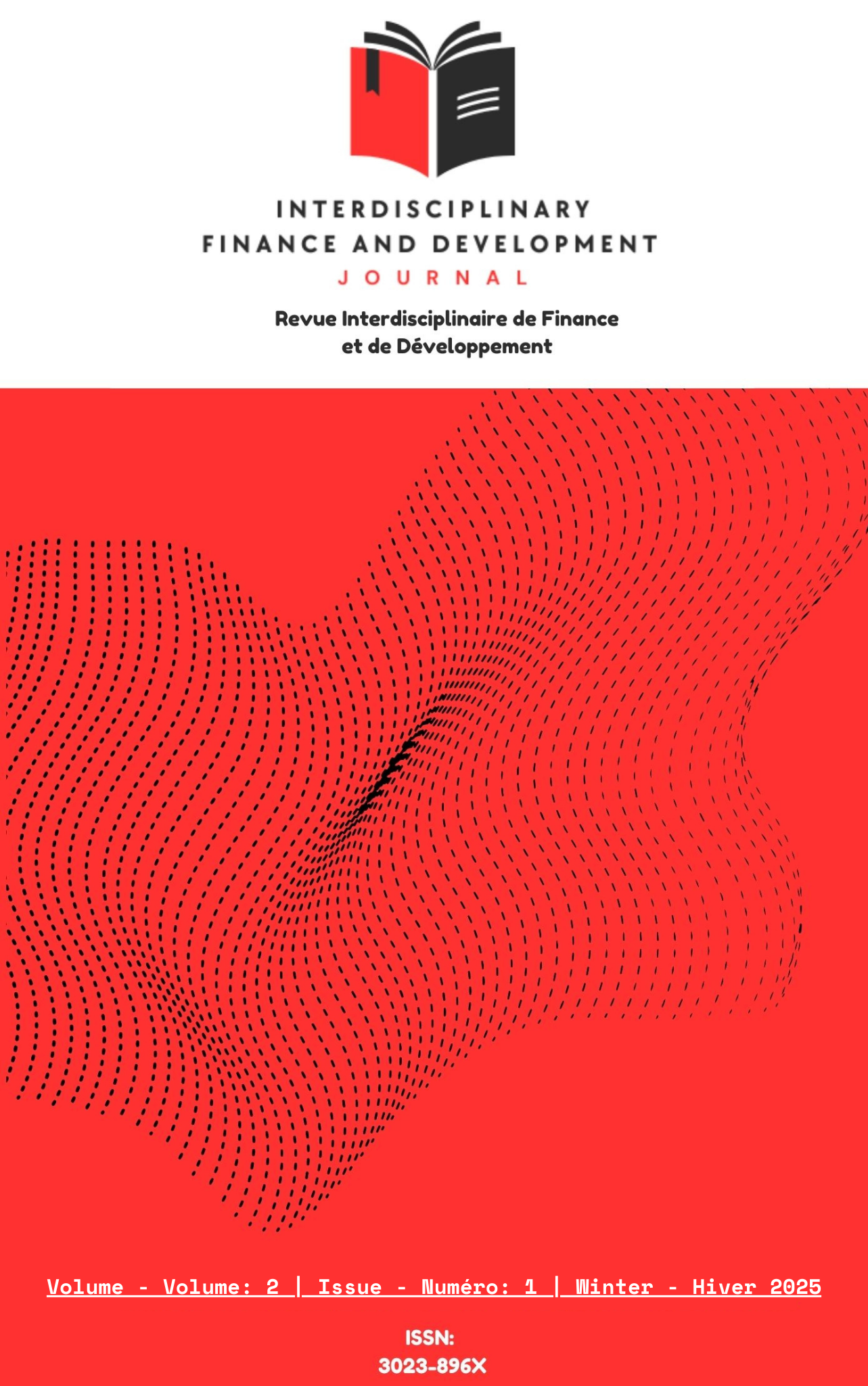Déverrouiller l'économie des petits boulots : Clarification du statut d'emploi des travailleurs de la gig economy
Mots-clés :
Gig Economy, Entrepreneurship, Gig Workers, Uberization, Platform Work, App-Based Economy, Algorithms, Precarious WorkersRésumé
Cette étude examine la croissance rapide de l'économie des petits boulots, un secteur dynamique alimenté par des plateformes numériques qui mettent en relation la demande du marché et les talents qualifiés. Bien que ce secteur suscite une attention considérable dans divers domaines académiques, l'absence d'une définition claire et universellement acceptée du travail de petits boulots a entraîné une ambiguïté persistante concernant le statut d'emploi des travailleurs concernés. Cette recherche vise à clarifier cette question en menant une analyse approfondie de la littérature existante sur le travail de petits boulots, avec un accent particulier sur Uber. Uber classe ses chauffeurs comme des travailleurs indépendants, mais notre analyse suggère que l’entreprise agit comme un entrepreneur institutionnel, remettant en question les classifications traditionnelles de l’emploi. Nous soutenons que les chauffeurs d’Uber occupent une position unique et précaire, caractérisée par une autonomie limitée et une surveillance algorithmique, qui échappe aux définitions standards des travailleurs indépendants, des employés ou des entrepreneurs. Cette étude souligne l'urgence de développer un cadre de classification clair et complet pour les travailleurs de la gig economy, afin de résoudre la confusion rencontrée par les parties prenantes dans cette économie en évolution.
Références
Alec Cram, W., & Wiener, M. (2020). Technology-mediated control: Case examples and research directions for the future of organizational control. Communications of the Association for Information Systems, 46, 70–91. https://doi.org/10.17705/1CAIS.04604
Blackham, A. (2018). “We are all entrepreneurs now”: Options and new approaches for adapting equality law for the “gig economy.” International Journal of Comparative Labour Law and Industrial Relations, 34(4), 413–434. Retrieved from http://www.kluwerlawonline.com/api/Product/CitationPDFURL?file=Journals%5CIJCL%5CIJCL2018019.pdf
Browder, R. E., Aldrich, H. E., & Bradley, S. W. (2019). The emergence of the maker movement: Implications for entrepreneurship research. Journal of Business Venturing, 34(3), 459–476. https://doi.org/https://doi.org/10.1016/j.jbusvent.2019.01.005
By, R., Mishel, L., & September, C. M. (2019). Uber drivers are not entrepreneurs NLRB General Counsel ignores the realities of driving for Uber.
Casagrande, L., Zamora, M. A. M., & Oviedo, C. F. T. (2021). Motorista de uber não é empreendedor. Revista de Administracao Mackenzie, 22(2), 1–24. https://doi.org/10.1590/1678-6971/ERAMG210003
Codagnone, C., & Martens, B. (2017). Scoping the Sharing Economy: Origins, Definitions, Impact and Regulatory Issues. SSRN Electronic Journal. https://doi.org/10.2139/ssrn.2783662
Cram, W. A., Wiener, M., Tarafdar, M., & Benlian, A. (2020). Algorithmic controls and their implications for gig worker well-being and behavior. International Conference on Information Systems, ICIS 2020 - Making Digital Inclusive: Blending the Local and the Global, (December).
Cram, W. A., Wiener, M., Tarafdar, M., & Benlian, A. (2022). Examining the impact of algorithmic control on Uber drivers’ technostress. Journal of Management Information Systems, 39(2), 426–453.
Dubal, V. B. (2017). The Drive to Precarity: A Political History of Work, Regulation, & Labor Advocacy in San Francisco’s Taxi & Uber Economies. Berkeley Journal of Employment and Labor Law, 38(1), 73–135.
Eisenbrey, R., & Mishel, L. (2016). Uber business model does not justify a new “independent worker” category. Economic Policy Institute, (2015), 1–14.
Goods, C., Veen, A., & Barratt, T. (2019). “Is your gig any good?” Analysing job quality in the Australian platform-based food-delivery sector. Journal of Industrial Relations, 61(4), 502–527. https://doi.org/10.1177/0022185618817069
Holland, P., & Brewster, C. (2020). Contemporary work and the future of employment in developed countries. Contemporary Work and the Future of Employment in Developed Countries. Routledge. https://doi.org/10.4324/9781351034906
Land-, C. (2019). On-demand … and organized !, (April 2018), 2018–2020.
Makó, C., Miklós, I., Pap, J., & Nosratabadi, S. (2021). Emerging Platform Work in the Context of the Regulatory Loophole (The Uber Fiasco in Hungary). SSRN Electronic Journal, 1–29. https://doi.org/10.2139/ssrn.3764851
Newaj, K. (2023). Re-evaluating the Employment Status of Uber Drivers in South Africa: Lessons from the United Kingdom and New Zealand. Comparative and International Law Journal of Southern Africa, 55(2 & 3 SE-Articles), 31 pages. https://doi.org/10.25159/2522-3062/12748
Pregenzer, M., Remus, U., & Wiener, M. (2021). Algorithms in the Driver’s Seat: Explaining Workers’ Reactions to Algorithmic Control Technology-mediated control (TMC) View project critcal success factors View project, (May). Retrieved from https://www.researchgate.net/publication/351547785
Ramizo, G. (2021). Platform playbook: a typology of consumer strategies against algorithmic control in digital platforms. Information Communication and Society. https://doi.org/10.1080/1369118X.2021.1897151
Ray, S., Herman, N., & Sen, I. (2021). Disruptive transformation fueling gig economies. In 2021 IEEE Technology & Engineering Management Conference-Europe (TEMSCON-EUR) (pp. 1–7). IEEE.
Shibata, S. (2020). Gig Work and the Discourse of Autonomy: Fictitious Freedom in Japan’s Digital Economy. New Political Economy, 25(4), 535–551. https://doi.org/10.1080/13563467.2019.1613351
Veen, A., Barratt, T., & Goods, C. (2020). Platform-Capital’s ‘App-etite’ for Control: A Labour Process Analysis of Food-Delivery Work in Australia. Work, Employment and Society, 34(3), 388–406. https://doi.org/10.1177/0950017019836911
Watson, G. P., Kistler, L. D., Graham, B. A., & Sinclair, R. R. (2021). Looking at the Gig Picture: Defining Gig Work and Explaining Profile Differences in Gig Workers’ Job Demands and Resources. GROUP & ORGANIZATION MANAGEMENT, 46(2), 327–361. https://doi.org/10.1177/1059601121996548
Wiener, M., Cram, W., & Benlian, A. (2021). Algorithmic control and gig workers: a legitimacy perspective of Uber drivers. European Journal of Information Systems, 00(00), 1–23. https://doi.org/10.1080/0960085X.2021.1977729
Woo, C. P., & Bales, R. A. (2017). The Uber million dollar question: Are Uber drivers employees or independent contractors? Mercer Law Review, 68(2), 461–488.
Woodside, J., Moos, M., & Vinodrai, T. (2021). Bottom-up strategies, platform worker power and local action: Learning from ridehailing drivers. Local Economy, 36(4), 325–343. https://doi.org/10.1177/02690942211040170
Téléchargements
Publiée
Comment citer
Numéro
Rubrique
Licence
© Interdisciplinary Finance and Development Journal 2025

Ce travail est disponible sous la licence Creative Commons Attribution 4.0 International .



